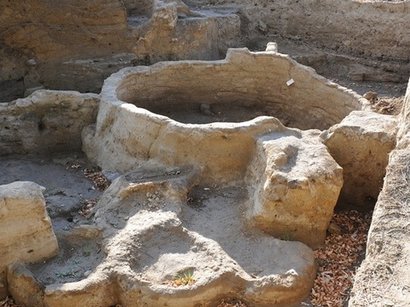ID :
297268
Wed, 08/28/2013 - 14:18
Auther :
Shortlink :
http://m.oananews.org//node/297268
The shortlink copeid
New Caucasian Albania-era monuments found in Azerbaijan

By Nazrin Gadimova
An archaeological expedition of the Azerbaijan National Academy of Sciences (ANAS) Institute of Archeology and Ethnography, which is working in the Sheki, Gakh and Oguz regions, has discovered new monuments dating back to the ancient period of Caucasian Albania, a local TV channel reported on August 22.
According to the report, the archaeological expedition conducted excavations on the territory of the Yonjali settlement and necropolis, located in the Fazil village of Azerbaijan's Sheki region. During the excavations several graves were discovered at the necropolis.
As a result of the excavations an opportunity to trace the history of ancient Albania in the Caucasus emerged. It was established that the entire upper part of the necropolis is a cemetery. The history of this cemetery is similar to the period of the Khojaly-Gadabay culture, according to the report.
There are five archaeological monuments near the Fazil village and in the village itself. Since 2002, these monuments have been protected by the Azerbaijani Ministry of Culture and Tourism.
Earlier, it was reported that during archaeological research in Galatepe village of Azerbaijan's Agdjabedi region, a 9 meter deep cultural layer, including a wall made of bricks dating back to II century BCE to II century AD, a public building occupying space of 56 square meters, a hall and a street were discovered. These finds show the high development of brick architecture in Azerbaijan in the ancient period. The base of the 9 meter deep column made of limestone, hearths, a layer of ash, remains of burnt wood, red ceramics with rich patterns, flooring plastered with clay, and 40 centimeters wide reinforced soil were found.
The online newspaper is available at www.azernews.az.





